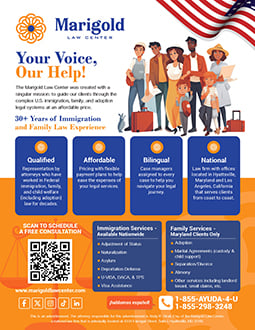Helping You Overcome Immigration Hurdles: Inadmissibility Waiver Applications
Migrants with problematic immigration or criminal histories may not be allowed to enter the United States, become lawful permanent residents (LPR) or go through consular processing outside the country.
However, there is a possible solution. These obstacles can potentially be removed with an inadmissibility waiver. During this process, a migrant’s past issues may be forgiven, allowing them to pursue their immigration goals.
To seek a waiver, applicants must file Form I-601, Application for Waiver of Grounds of Inadmissibility, or, in some cases, Form I-601A, Application for Provisional Unlawful Presence Waiver.
At Marigold Law Center, we understand that past mistakes should not disqualify you or your family members from realizing your dreams. Our experienced and compassionate lawyers can help you apply for a waiver of inadmissibility and other complicated immigration matters. With offices in Hyattsville, Maryland, and Los Angeles, California, we help people nationwide with these challenging issues.
Common Forms Of Inadmissibility
A migrant may be inadmissible for several reasons that usually fall into one of three main categories:
- Unlawful presence: If a migrant has been in the United States for more than 180 days without lawful status, they have likely triggered an inadmissibility ground.
- Fraud to obtain immigration benefits: If a migrant has used or submitted false or fake documents or has assumed a false identity to obtain an immigration benefit, they have likely triggered an inadmissibility ground.
- Criminal activity: If a migrant has committed certain crimes, such as possession of illegal substances, prostitution, robbery, theft, etc., they have likely triggered an inadmissibility ground.
Unlawful Presence Waiver
Unlawful presence may be waived by filing Form I-601 or Form I-601A. Migrants living abroad with prior unlawful presence use Form I-601 or Form I-601A if they are currently living in the United States.
In either case, as with a successful waiver application, the U.S. embassy in a migrant’s country cannot deny their visa request because of their unlawful presence.
To qualify for this waiver, a migrant must establish that their qualifying United States citizen, LPR relative (parent or spouse) or K visa petitioner would experience extreme hardship if denied admission to the U.S. Those seeking Form I-601A must also have an approved Form I-130, Petition for Alien Relative, or Form I-140, Immigrant Petition for Alien Worker, and an immediately available visa.
Fraud To Obtain An Immigration Benefit
Like prior unlawful presence, immigration officials may waive a migrant’s prior fraudulent behavior if they can prove that their qualifying LPR (parent or spouse), U.S. citizen or K visa petitioner would suffer excessive hardship if denied admission.
Criminal Activity
Depending on the crime committed and the punishment given, a migrant might be found inadmissible. Officials may waive these crimes if one of these conditions is true:
- A migrant is inadmissible only due to participating in prostitution, including procuring others or receiving proceeds from prostitution, and said migrant has been rehabilitated.
- The crime happened a minimum of 15 years ago, and the migrant is rehabilitated.
- The migrant’s qualifying K visa, U.S. citizen or LPR (spouse, parent, daughter or son) petitioner would suffer excessive hardship if denied admission.
- The migrant is an approved self-petitioner through the Violence Against Women Act (VAWA).
Note that officials do not waive certain crimes. It is important to disclose all your criminal activity so an attorney at Marigold Law Center can properly assess your case.
Let Our Knowledgeable Lawyers Help You Overcome Obstacles. Call Us Today.
For more information on inadmissibility waiver applications and to determine your eligibility, call us toll free at 323-714-0195 or email us to schedule a free consultation with one of our experienced and compassionate immigration attorneys.


